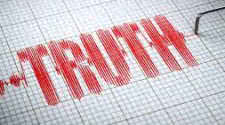The Use of Polygraph Tests in Bodybuilding

Is is Really Considered Cheating if ALL the Athletes do it?
How does a polygraph work? Are they really accurate?
Most bodybuilders who compete in natural shows have experienced being hooked up to a polygraph machine. These machines, which cost over $4000, record the physiological responses of an athlete, detecting our common human reactions to the fear of being caught doing something wrong. Three measurements are usually taken: galvanic skin response, heartbeat/pulse rate and breathing pattern. A guilty person will show a reaction on all three measurements.The galvanic skin response records the wetness produced in the second and ring fingers of the athlete's hand. This is done by attaching a moisture-sensitive metal plate to the fingers with a Velcro strip. A person who gives false information will "perspire" in a predictable pattern.
At the same time, a clamp is attached to a finger of the other hand to measure the athlete's heartbeat/pulse rate. The normal heart rate is 72 beats per minute. Guilty persons have higher heart rates, particularly when questions relating to steroids and diuretics are asked. While some athletes take tranquilizers to reduce their heart rate, a trained polygraphist can detect the subtle changes in heart patterns caused by these drugs. Also, tranquilizer users usually overcompensate, producing a heart rate so slow that it clearly establishes guilt.
The third measurement is breathing pattern. This is detected by one or two elastic pneumatic tubes that are wrapped around the chest. The normal athletic male breathes 10 to 12 times per minute. Guilty persons, however, try to fool the machine by either holding their breaths (increasing volume and reducing frequency) or by taking many short breaths. In either case, the polygraphist picks up the variations in breathing pattern.
According to Art Gren, president of AGI, a Los Angeles-based polygraph firm, "People are only fooling themselves if they think they can fool the polygraph. You can't beat this diagnostic instrument!" It may have been possible, he noted, to fool the human interpreters of the machine in the past, but this is becoming increasingly rare as more and more states require licensing for polygraphists. What, then, is the best way to pass a polygraph test, according to AGI? "Stay natural! Then you'll have nothing to worry about." By the way, more women than men flunk polygraph tests, and the most frequent violation is for diuretics.
Are there going to be more NPC natural national qualifiers this year?
The National Physique Committee is trying to push the idea of natural national qualifiers across the country. In 1989 there were nearly 20 of these contests, and the NPC hopes that promoters will agree to hold them in every state of the Union in 1990.
According to NPC President Jim Manion, natural national qualifiers are difficult to promote because the required drug tests are so expensive. There are only two laboratories in North America that have been approved by the International Olympic Committee for drug testing. These labs charge up to $250 per test, which adds up quickly. The two labs are also very busy, so it can take a long time to get results.
The NPC is looking for nutritional supplement companies to subsidize the cost of testing so that more shows can be held throughout the country. Weider Health and Fitness has also committed itself to helping pick up the cost of drug testing for local promoters in 1990. At the same time, Dr. Bob Goldman, who heads up the medical committees for the NPC and IFBB, is trying to get additional labs approved by the International Olympic Committee. This would make it more convenient for contest sponsors and, hopefully, reduce the price of the test. Until this happens, however, the NPC feels it would not be fair to force sponsors to hold a natural national qualifier against their will.